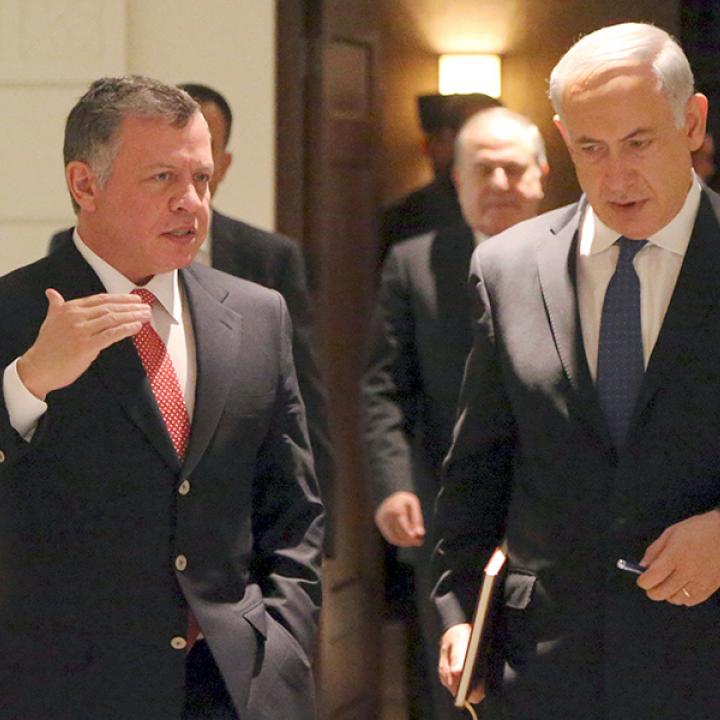
- Policy Analysis
- Fikra Forum
Jordan’s Balancing Act: Overcoming the Challenges Posed by Trump’s “Deal of the Century”

On January 29, the Trump administration unveiled the political aspect of the long-awaited ‘Deal of the Century.’ This announcement came six months after the Manama workshop in Bahrain, which focused on the Plan’s economic vision, including proposals for investment and infrastructure projects in Palestine worth around $50 billion. The newly unveiled Peace Plan referred to Jerusalem as “the unified capital of Israel,” but also called for the creation of a new, demilitarized Palestinian state consisting of the Gaza strip and approximately two-thirds of the West Bank—linked by a series of roads and tunnels.
While Jordan has not directly rejected the plan, it has maintained several reservations and insisted that any new peace agreement with Israel must uphold the previously agreed upon conditions. As King Abdullah II stated in an appearance on the Kingdom TV channel, “Our position is well known. We will not agree to any proposals that come at our expense.” Yet despite these reservations, the Hashemite government will likely attempt to maintain the balance between supporting the Palestinian Authority (PA) and the internationally backed two-state solution while avoiding opposition to Washington’s long-standing role in the peace process.
Jordan fears the proposed Peace Plan will lead to a greater influx of Palestinian refugees—upsetting the country’s demographic balance and ultimately turning it into a Palestinian state. Jordan is also anxious about the potential security threats and strategic risks that would endanger Jordanian sovereignty under the Trump Peace Plan. In this vein, the PA’s decision to discontinue its security coordination with Israel at the emergency meeting to discuss Trump’s plan has deeply concerned the Hashemite Kingdom, raising fears about radical elements that seek to destabilize the region moving into the West Bank.
There is also the major additional concern that Israel will start to implement Trump’s Plan unilaterally by annexing the Jordan Valley and other settlements specified in the document, thereby leaving Jordan cut off from the West Bank. Yet after an initial announcement from Israeli Prime Minister Benjamin Netanyahu that suggested Israel would attempt a unilateral annexation of the territory, subsequent statements appear increasingly tied to direct U.S. approval. And in the days following the announcement of the “Deal of the Century,” Jared Kushner—the plan’s architect—spoke with CNN and ruled out the possibility of such a unilateral move by the Israelis.
Hashemite officials also fear that public anger over the Plan will force them to curtail cooperation with Israel in vital sectors such as energy, water, trade, and military security. The Jordanian parliament, along with labor unions and parties, have demanded that their leaders cancel a number of agreements with Israel—including the gas deal and Wadi Araba agreement.
In turn, the Jordanian government will likely attempt to persuade public opinion that withdrawing from bilateral agreements with its western neighbor will harm Jordan more than it will harm Israel. Ultimately, Jordan would lose its ability to support the Palestinian cause and, more importantly, its historic role as a custodian of the Jerusalem holy sites by stepping out of said bilateral agreements.
More broadly, the Jordanian strategy vis-à-vis the “Deal of the Century” is all about maximizing gains and reducing losses. In this regard, the Hashemite Kingdom will likely avoid further disagreements with the United States by separating the politics of the Peace Plan from Jordan’s commitment to preserving its economic relations, security cooperation, and counter-terrorism partnership with Washington.
Jordan already holds a decent track record in this regard. For example, following talks with the Jordanian monarch in January 2018, U.S. Vice President Mike Pence announced, “We’ve agreed to disagree with the King on Jerusalem.” At the same time, King Abdullah II warned President Trump of the consequences that come with recognizing Jerusalem as the capital of Israel, describing it as a “threat to the stability of the region.”
Jordan will also endeavor to strengthen its role as guardian of the Islamic holy sites in Jerusalem, as guaranteed by Article 9(2) of the 1994 Jordan-Israel Peace Treaty. The Peace Plan reaffirms the status quo set in 1994, but also stipulates that Jordanian authorities must consult with Israel in all matters concerning the Al-Aqsa Mosque—likely giving Jordan a greater chance to influence the course of the upcoming Palestinian-Israeli negotiations.
The Jordanian government is also expected to play an active role, with help from other Arab countries, in creating favorable circumstances for future dialogue between Palestinians and Israelis. Trump’s plan reiterated the need for direct talks between the two sides within the framework of a two-state solution—a solution that Jordan supports. If these negotiations are launched in the near future, Jordan must work to coordinate with the PA to advocate for the latter’s economic and political interests. This coordination between the PA and Jordan will expand the volume of trade between Jordan and the West Bank, allow for easier access to Jordanian exports, eventually open up access to Israeli markets, and increase Jordan’s share of drinking water under a Jordanian-Palestinian agreement.
Jordan is an indispensable part of the peace equation, evidenced by Jordan’s strong presence at international events related to the Palestinian cause. Therefore, the United States must take the necessary steps to ensure Jordan’s stability, which remains essential to that of the broader Middle East. This requires that the United States to allocate greater monetary aid and encourage U.S. partners in the Gulf to increase investments in the Hashemite Kingdom. Economic and political stability in Jordan—whose economy depends primarily on foreign aid—will help allay domestic anxieties and motivate the government to play a more effective and positive role in any future negotiations between Israelis and Palestinians.


